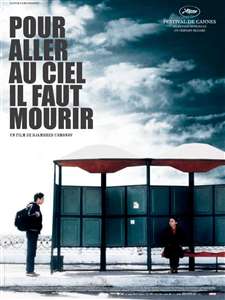
An unexpected pleasure, and one of the best films of the films so far this year is To Get To Heaven First You Have To Die, the third film by the Tajik director Jamshed Usmonov. I had seen his previous one, The Angel On The Right, which was released in 2003 and treated of the release from prison of a small-town alcoholic. It was an impressive, if not overly remarkable film. To Get To Heaven though is a real breakthrough for a director who benefits from a generous attitude from French producers who provide him with skilled technicians as well as the necessary funds.
The tale tells of Kamal a young married man unable to consummate his marriage due to what are probably erectile problems. He goes to visit his cousin in the Tajik capital, Dushanbe for no apparent reason and on the way and while there he stalks women with little success. Even when his cousin books him a date with a prostitute his faltering returns as it does when one of his stalkees invited him home. The film takes a turn for the slightly generic when the woman's husband catches him in bed with her and, instead of assaulting him, urges Kamal to help him in a few raids on the wealthy homes of the capital. The husband, played by Maruf Pulodzoda, the alcoholic of The Angel On The Right, is a physically fascinating villain, his brooding, barely-constrained violence contrasting superbly with the glazed impassivity of Kamal, whose Buster Keaton eyes enquire, provoke and frustrate.
The film is full of scenes that operate as mini-narratives and which lurch towards one possibility before sidestepping in another direction. The first of these is the opening scene where Kamal strips for some unclear reason before we realise it is a medical inspection, and then the doctor's probing questions about his marriage night suggest that he might just be an old pervert. We are about forty minutes into the film before the first ordinary, less-than-brilliant scene arrives; the film's average soon picks up again though. Highlights are the scene where Kamal follows an attractive older women on his train journey and the scene where he helps a flirty woman bring her shopping home only to discover her husband when he reaches her apartment. The photography and editing are second to none, and though the chain of fantastic scenes might suggest an overabundance of brilliance, the film never seems strained or too rich. Elsewhere it is almost perfect: there is very little dialogue but when there is it is excellent and often mordantly funny, and though the mise en scene is painstakingly precise the action does not seem mannered or choreographed. There is real emotion in the characters and the acting is never catatonic, as is often the case in art movies of this type.
Of course the film is not perfect; as the plot summary above indicates, the plotting is perfunctory in the extreme and characters, such as Kamal's cousin disappear as mysteriously as the Fool in King Lear. There is also something mechanical in the passage à l'acte which allows Kamal to overcome his condition, in the spirit of the title. But the film's superb technique and direction married with its detail, at once economical and rich makes it unforgettable. What really clinched it for me was the insight into everyday life in a city and country we know so little about it gives. Central Asia looks fascinating, a whole sub-continent that was obscured to the world for so long under the blanket of Russianness. This is a film I recommend everyone see; you will not be disappointed.





0 comments:
Post a Comment